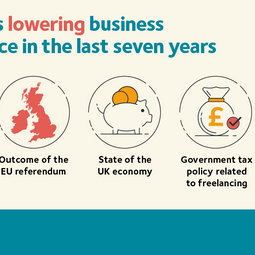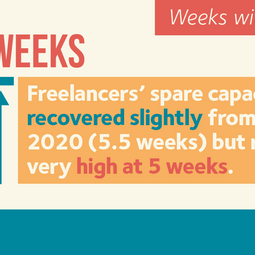Brexit deal: a brief guide on what it means for freelancers
- 08 Jan 2021
- Alasdair Hutchison
While the coronavirus pandemic understandably continues to dominate headlines, it is easy to forget that the UK has just undergone arguably its biggest economic change in fifty years. The deal reached with the EU before Christmas – known officially as the EU-UK Trade and Cooperation Agreement (TCA) – on the trading relationship that will replace membership of the Single Market and Customs Union will have far-reaching effects on businesses.
Running to 1246 pages, the deal covers a huge range of new regulations and technicalities covering everything from fisheries and trade arrangements, to procurement and travel.
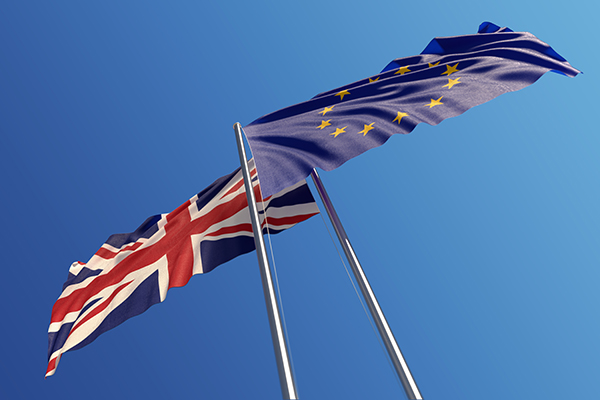
But what does the deal mean for one-person businesses, freelancers and the self-employed? While the implications will vary depending on the exact nature of your business, we have outlined some of the key considerations resulting from the agreement that are likely to impact freelancers – and signposted further advice on GOV.UK as well.
Mobility: new rules on business travel
- Freedom of movement with the EU has come to an end
- You can travel visa-free for 90 days in any 180-day period for tourism and some business purposes
- You must check the entry requirements for the individual member state you are visiting or working in to ensure you comply with their immigration regime, and ensure your passport is up to date
The trade deal provides a bit more detail on how mobility to and from the EU will work now that freedom of movement has ended.
From January 1st you can travel to most EU countries for up to 90 days in any 180-day period without a visa for purposes such as tourism and some business travel. Stays beyond 90 days may require a visa, work permit or other documentation. The list of allowed activities (which can be found on page 745 of the treaty) includes things such as attending meetings, trade fairs and exhibitions, sales and purchasing, commercial transactions and translating/interpretation services.
However, this is not comprehensive for two reasons. First, as Sam Lowe, senior research fellow at the Centre for European Reform, states: “anything that involves selling goods or services directly to the public requires an actual work visa”. He gives the example of a British fashion model who could still go to Italy for meetings and to make connections without additional paperwork, but if they wanted to take part in a paid fashion show or photoshoot, they would need to obtain an Italian work visa.
Second, you must check if there are additional entry requirements you might need (such as visas or work permits) depending on the specific EU member state you’re visiting. Individual countries have their own immigration regimes which may mean that even the activities listed in the TCA could come with additional obligations depending on the sector you work in (a list of these can be found on pp.752-761). Austria, for example, requires a work permit in several areas.
What does this mean for British contractors and consultants working in the EU?
Some concerns have been raised that the TCA might mean changes for consultants and contractors who are used to working in the EU on a so-called ‘parachute’ basis. This is where, for example, a UK-based staffing company or consultancy deploys a British contractor into an EU member state for work over a period of months. Requirements may be introduced for those companies to have a local establishment and licence, or prohibiting the use of UK workers on the same basis as before altogether.
Everyone, including businesspeople, will have to apply for a European Travel Information and Authorization System (ETIAS) Visa waiver for €7 to travel to the continent starting in 2022. You will also need your passport to both have at least six months left and be less than 10 years old (even if it has six months or more left).
Paying social security after Brexit
- You may need to pay social security contributions to the country you work in rather than HMRC, depending on the length of your contract
GOV.UK guidance states that you might be able to carry on paying National Insurance to HMRC in the UK if you are usually self-employed in the UK and are working abroad temporarily (for up to two years).
If you are working on a longer-term contract of more than two years, depending on who your client is and where they are based, you may have to pay into social security abroad, instead of National Insurance, and inform HMRC using the form CA3837.
You’ll need to get a ‘Portable Document A1’ as proof. To check if you can get one, fill in form CA3837 and send it to the address on the form. If you’re the director of your own limited company, fill in form CA3822 instead.
Health insurance
- Your EHIC will remain valid until it expires – you will need to replace it with a ‘GHIC’
While there was some uncertainty about what would happen to UK residents with European Health Insurance Cards (EHIC) this is another area where progress has been made in the Protocols that accompany the TCA.
An EHIC gives you the right to access state-provided healthcare during a temporary stay in the EU. If you have an existing EHIC it will continue to be valid in the EU until it expires. The UK Government has announced it will soon be replacing the EHIC with a new ‘UK Global Health Insurance Card (GHIC)’, which you can apply for once your own EHIC expires. The GHIC will be valid if you’re travelling to an EU country, although it will not cover Switzerland, Norway, Iceland or Liechtenstein. More information can be found here.
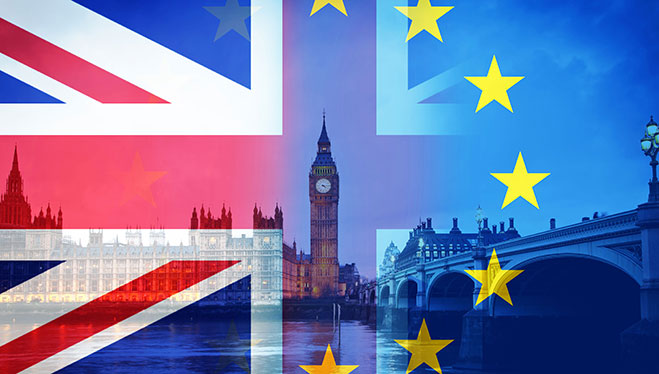
Selling services and working in the EU
- There is no longer mutual recognition of professional qualifications
- A six-month holding agreement should ensure the free flow of data until a UK-EU adequacy agreement is reached
- There are changes to Intellectual Property – check if you need to have an EU registered trade mark
As we wrote in our blog before the deal was struck, UK businesses and professionals selling services into the European Economic Area (EEA) will no longer be treated as if they were local businesses. Instead, you will have to comply to each country’s rules when selling. You can find out more about the trading regulations and requirements of each member state here. But there are some broader key areas to think about.
First, there is no longer mutual recognition of professional qualifications. If you have specific accredited UK qualifications and are looking to work and provide services in the EU, you will need to check these are recognised in the country you are looking to work into. There is no more automatic recognition of professional qualifications: doctors, nurses, dentists, pharmacists, vets, engineers, or architects must have their qualifications recognised in each member state they wish to practice in.
While there is no firm agreement in place here, the CTA does include a framework that allows for professional bodies in the EU and the UK to put forward proposals for mutual recognition to exist in the future on particular areas, and possibly bilaterally between the UK and another member state. But this looks like it could be a long time coming. In the meantime, the government advises UK-qualified professionals consult GOV.UK for more information.
Second, there may be new rules about data transfers and protection in the future, if you or your business sends personal data to the EU. However, the TCA contains a bridging agreement that allows the continued free flow of personal data from the EU/EEA to the UK for up to six months. After that point, it is hoped that the EU and UK will reach an adequacy decision allowing the ongoing free flow of data. Otherwise, you may need to take actions such as getting Standard Contractual Clauses (SCCs) in place to keep data flowing lawfully.
Third, another area where there has been potential change for services providers is intellectual Property (IP). If you are the owner of an existing EU trade mark registration, this will be automatically granted a new UK-registered trade mark.
If you have a pending EU trade mark, you will need to reapply for the corresponding mark in the UK. If it is due for renewal after 1 January 2021, you will need to pay renewal feels to the EU office and UK office to maintain your current level of protection. Lastly, if you own a UK trade mark an want your business to expand into the EU, it is worthwhile submitting an application for an EU trade mark for protection. More extensive information on IP and copyright changes can be found here.
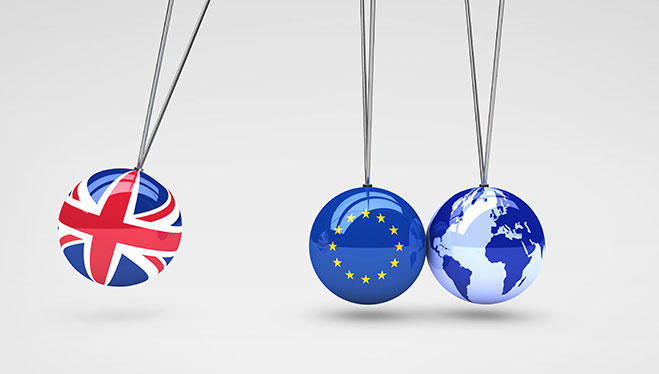
VAT for services
- There may be changes to where you apply VAT when selling services
The supply of services may also incur some tax changes, particularly about where VAT is applied. If you are supplying cross-border digital services to non-business customers, the government advice is that you should check:
- the location of your consumer
- whether it’s a digital service (this mostly covers a range of radio, TV broadcasting and telecoms services) or not (communicating or facilitating trade over email, for example, does not count). If it is not, the general place of supply of services rules will apply
- whether your customer is a business or a private consumer
- if you are a UK business and the supply is not made in the UK, you’ll need to check the rules in the country of the customer, as you may have to register for VAT or its equivalent in the country
To use the UK’s VAT Mini One Stop Shop (MOSS) to declare sales of digital services to EU consumers, businesses need to register for MOSS in an EU member state.
Trade in goods
-
The deal ensures zero-tariff, quota free trade – but there will be customs formalities to consider
Perhaps the biggest and most visible change under the TCA relates to the importing and exporting of goods. The good news is that the deal has achieved zero-tariff and zero quotas. But this does not mean friction-free trade when it comes to goods. While customs procedures have been simplified relative to a ‘no deal’ scenario, checks will still apply to all goods traded into and out of the EU.
The extent of these changes are too lengthy to detail here, but if your self-employed business trades goods into and out of the EU, the government recommends you consider how to deal with necessary customs declarations and register for an Economic Operators Registration and Identification (EORI) number. GOV.UK has step-by-step guides available for importing and exporting goods. Similarly to services, this will also have implications for tax and VAT.
The big question: is it a good deal?
Many businesses, particularly SMEs, will have breathed a sigh of relief that an agreement was reached at all, and a ‘no deal’ scenario entailing tariffs and quotas was avoided. But the extent of the impact of changes resulting from the agreement will vary widely depending on specific sectors and activities. The devil will likely be in the (copious) detail of the agreement, and it will take some time for the changes to really bed in. There may be instances where UK businesses unwittingly carry on as before, only to find (either at an airport border check or when receiving a package from the EU) that something has changed. The key point to understand is that the UK and the EU are now separate legal jurisdictions – and your business will have to adapt to satisfy both sets of requirements accordingly.
For freelancers, IPSE’s advice is to check the GOV.UK guidance carefully for any changes if you are engaging with customers or clients in the EU.
Meet the author

Alasdair Hutchison
Policy Development Manager
More on


